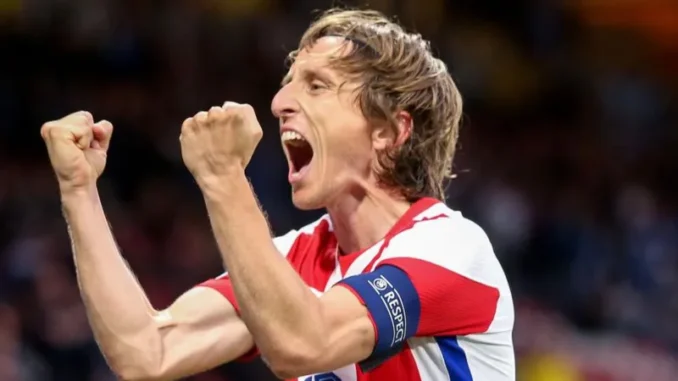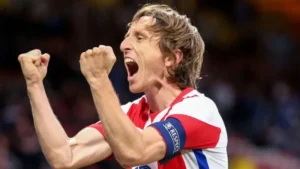

Regardless matter the result of Croatia’s Euro 2024 campaign, Luka Modric does not want to retire from the national team.
The 38-year-old midfielder for Real Madrid still hopes to compete in another World Cup, adding to his already legendary status and his record 177 appearances for his nation. They know going into their Group B match against Italy on Monday that only success will likely preserve them, and that a loss will inevitably lead to the unavoidable talk that Modric may have played his final game for his nation, regardless of his intentions. As captain since August 2016, he is revered in Croatia, a relatively young nation that honors its athletes. The fact that Modric’s success was attained in a way that many see as symbolic of Croatia’s own struggle for independence and eventual triumph adds to his grandeur. What an incredible adventure it has been and still is.
Modric should run for president’
It is hard to find the right words to describe the reverence that is shown for him throughout Croatia, but especially in his hometown of Zadar. During my recent visit to this pristine, serene town on the Dalmatian coast, a local told me that Modric ought to run for president.Nobody else could possibly compare. For next 100 years, there won’t be another like him.” The ascent of Modric has proven to be more difficult and challenging than the Velebit mountain’s slopes in the little village of Modrici, close to Zadar, where the young Luka used to herd his grandfather’s goats when he was five years old.
He used to pass the time on unsuitable land for farming, let alone watching football games, by kicking a ball in the direction of the garage door in the lonely home he shared with his grandparents and relatives. His grandfather was slain ten meters from that garage door following the outbreak of Croatia’s independence struggle. From this background, this pencil-thin, frail-looking youngster would rise above hardship to become one of his generation’s finest football players as well as one of his country’s most iconic icons.
His grandfather was put to death by Serbian rebels, and their home was destroyed by fire, so when the Croatian war of independence broke out, his family was forced to leave. For the following seven years, he and his family were refugees in Zadar, living in hotels where the young Luka would play football in unorganized games on the parking lots of the hotels with other kids to get away from the grim reality of war. He would later claim that he always noticed he was always portrayed with a ball when he looked back at images of himself from that era. After attending school and being accepted into the nearby Zadar academy, he signed a contract with the Dinamo Zagreb academy at the age of sixteen.
After attending school and being accepted into the nearby Zadar academy, he signed a contract with the Dinamo Zagreb academy at the age of sixteen. There are plenty of coaches, mentors, and professors in Croatia today who were there when he first started out and who will patiently stand in line to tell you how talented he was and how much potential he had. However, nothing could be more false. In actuality, Modric was an underdog during every stage of his growth. Never lacked confidence. Never thought of as a star.
‘He’s spent his career proving people wrong’
He was promptly loaned by Dinamo Zagreb to Zrinjski Mostar in the Bosnian League, where his sole assurance was that he would be constantly kicked in the ass. They’ll tell you today that they put him there to hone his skills and grow as a player, but there were also concerns about whether he was talented or strong enough. For the most of his career, Modric has refuted critics. Upon his return from his frequent kicks in Bosnia, 19-year-old Modric was immediately loaned out again, this time to Croatian team Inter Zapresic.
Eventually on his return, he showed enough over a four-year spell at the club where he scored 31 goals and had 29 assists to attract the attention of a variety of clubs around Europe, including Barcelona, Arsenal and Chelsea.
By the time he left to join Spurs in the spring of 2008 he had won three Croatian League titles.
Modric signed for Tottenham for £16.5m in 2008 to become the club’s then record signing but initially struggled and was regarded by many as not physically strong enough for the rigours of the Premier League.
Once again though he would prevail and Tottenham’s desire to hold on the player that so many had previously referred to as ‘lightweight’ was to no avail when Real Madrid came calling four years later.
Another club, another battle to win.
Protracted transfer negotiations meant a missed pre-season and the presence of Xabi Alonso and Mesut Ozil in Jose Mourinho’s Madrid side often saw him left out.
At the end of that first season, in a poll organised by Madrid newspaper Marca, he was voted by Real fans as the worst ever foreign signing at the club.
Mocked and derided, he used to be referred to as the guy that assists the guy who lays on the assists.
Mourinho was one of the first to spot his ability to shake up the play from his first touch and prevent teams like Barcelona from dominating with their high press. People soon realised he was the antidote to the high pressing, swift-regaining-of-possession game much loved by Barcelona.
From this moment on his status grew at the club.
Now, after winning 26 trophies including four La Liga titles and six Champions Leagues, he has faced and won another battle, another challenge at Real.
As he comes ever closer to the twilight of his career he has found himself used far less than in previous seasons, something manager Carlo Ancelotti had told him would happen.
He has become a decisive game changer in cameo displays in the dying embers of the most important of games.
Modric is not a good substitute. He walked the corridors of the training ground sulking for months. But he has felt important, especially in the last months of the campaign.
After Real hesitated on making a decision about his future – something they invariably do with players over 30 – they finally signed him for another year.
Despite offers on the table from the Major League Soccer and Saudi Arabia, he was desperate to stay having previously said his aim is be at the Bernabeu when he retires.
‘Croatia’s silent leader’
Modric has always been a central midfielder with Croatia but with the national side he has a less structured role than at club level, which allows him to express his natural flair and feeling for the game.
He has been described as the silent leader. He is not outwardly vocal and all those that play with him say his leadership comes from within.
His desire to carry on for his country is what sets him apart from his contemporaries and also explains why he enjoys iconic status.
After the 2018 World Cup in Russia, players such as Mario Mandzukic, Danijel Subasic and Vedran Corluka decided to bring the curtain down on their international careers, preferring instead to focus on whatever playing time they still had in club football.
This was never an option for Modric.
Many believe that his influence on the game and on Croatian football is so great that he doesn’t need to score goals and make assists to be the most important player on the field.
As happy as he is to talk about football he is an intensely private family man – as are his parents – all of them quiet and unassuming, and proud in the knowledge they have come through adversity without wishing to spend their time dwelling on the past, preferring instead to look to the future.
There is an elephant in the room.
In 2018, he was charged with making false statements at the tax fraud trial of Zdravko Mamic, a former executive director at Dinamo Zagreb, including the deal that took Modric to Tottenham in 2008.
A Croatian court lifted those charges on the eve of the 2018 World Cup, where Croatia lost in the final to France. Modric won Fifa’s Golden Ball as the best player at the tournament.
The story still hurts Modric and his family. He survived the scandal though.
Throughout his career, Modric has given his country identity and in the process has himself been elevated to a special status.
Croatians praise their champions as a way of setting an example to the youth but also to reinforce the feeling that their country is special, strong and unbeatable.
All that also means that nothing from the past can leave a mark on his profile in the eyes of his compatriots.
Try taking yourself back to the evening when he won the Ballon d’Or. Imagine the pride of his father upon the realisation that the best player in the world was his boy, that same kid that herded goats in the rugged mountains of Zadar.
His son, and a son of Croatia.
Leave a Reply